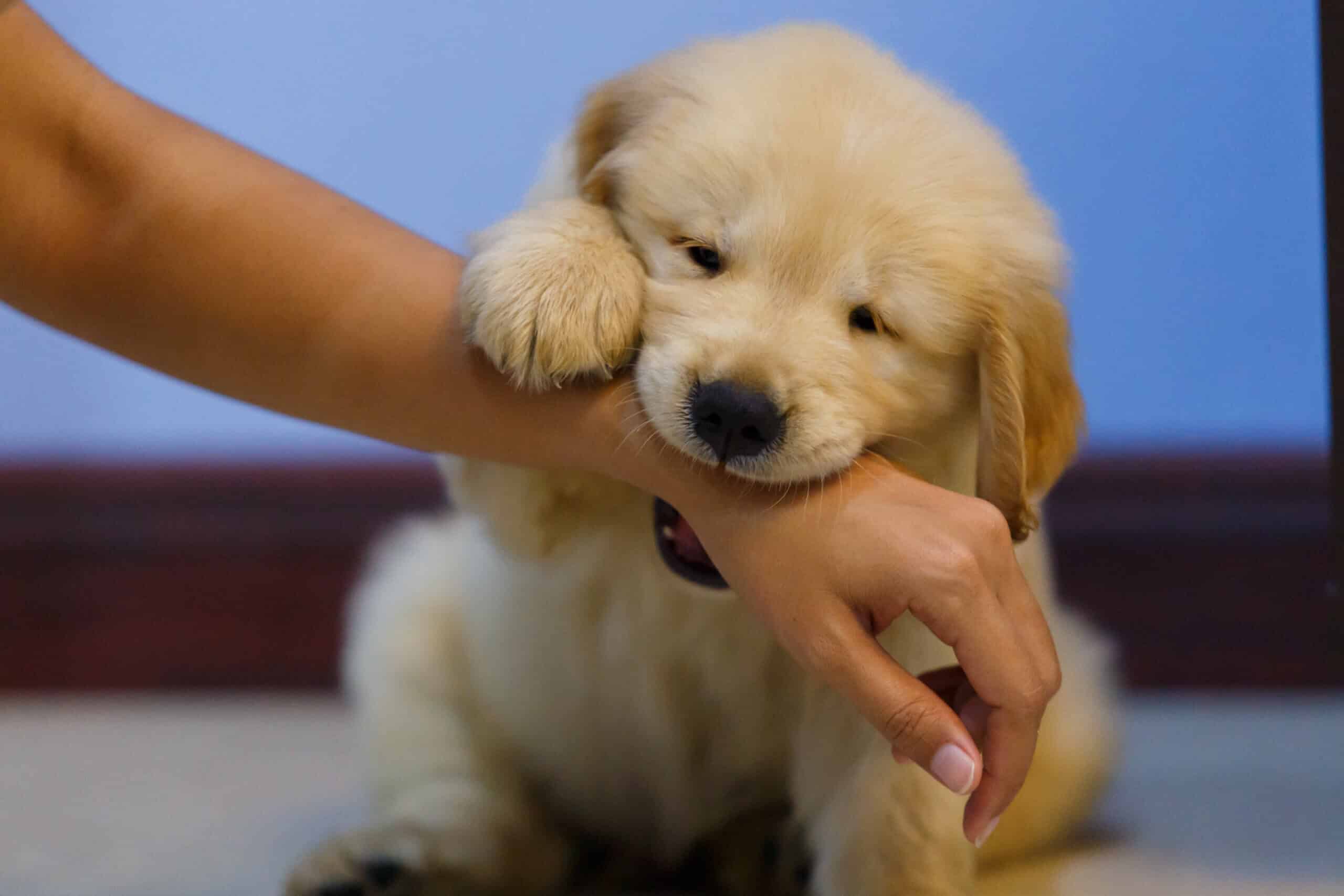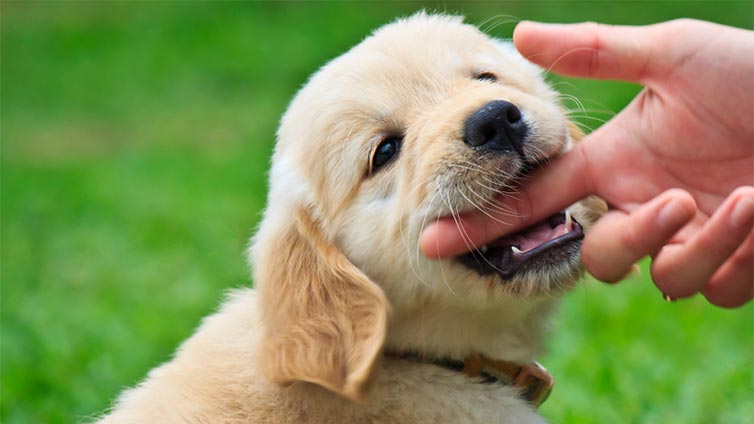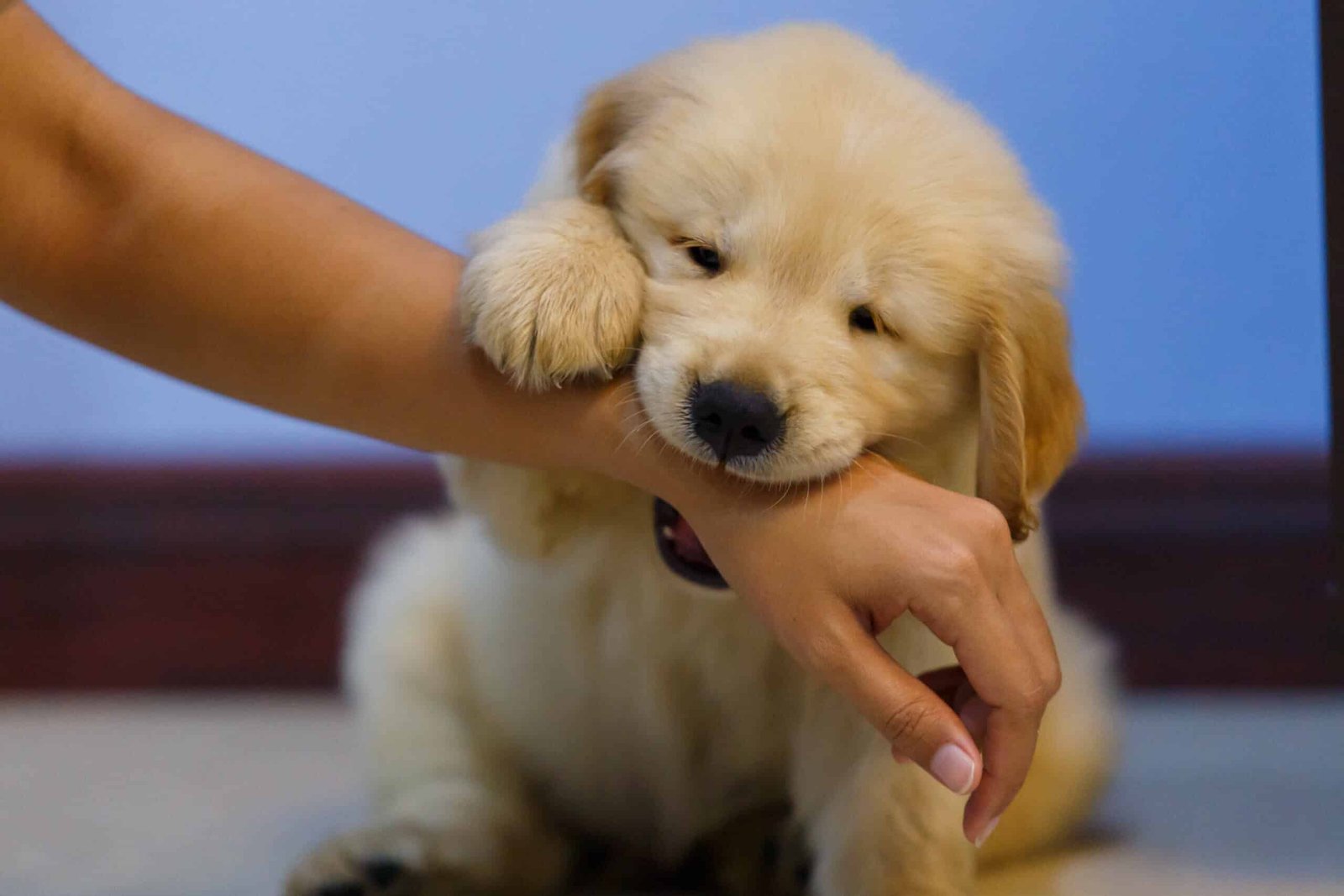If you’ve ever been around a golden retriever puppy, you might have noticed their tendency to nibble or nip at your hands and feet. But why do golden retriever puppies bite? Well, it turns out, there are a few reasons why these adorable little furballs can’t seem to resist sinking their teeth into everything they come across. So, let’s dive right in and explore the fascinating world of golden retriever puppy behavior!
Golden retriever puppies are known for their playful and energetic nature. They love to explore the world around them, and one of the ways they do that is through their mouths. Just like human babies, puppies use their mouths to interact with objects and learn about their surroundings. So, when they bite, it’s often because they are curious and trying to understand the world from a different perspective.
Another reason why golden retriever puppies bite is because they are teething. Just like human babies, puppies go through a teething phase where their baby teeth are replaced by their permanent ones. This can be quite uncomfortable for them, and gnawing on things helps alleviate the discomfort. So, if you find your golden retriever puppy biting on everything in sight, it’s likely because they are teething and looking for relief.
So, the next time a golden retriever puppy sinks their teeth into your finger or shoe, remember that it’s all part of their natural behavior. They are exploring, teething, and learning about the world around them. But don’t worry, with a little training and patience, you can teach your furry friend to curb their biting habits and become the gentle, well-behaved companion you’ve always dreamed of. So, let’s embark on this pawsome journey together!

Why Do Golden Retriever Puppies Bite?
Golden Retriever puppies are known for their adorable looks and playful nature. However, many new owners may be surprised or concerned when their furry friend starts nipping or biting. It’s important to understand that puppy biting is a natural behavior and a crucial part of their development. In this article, we will explore the reasons behind why Golden Retriever puppies bite and how to address this behavior effectively.
Understanding Teething
One of the main reasons why Golden Retriever puppies bite is because they are teething. Like human babies, puppies go through a teething phase where their baby teeth fall out and adult teeth start to grow in. This process can be uncomfortable and at times painful, leading them to seek relief by chewing and biting. It’s essential to provide appropriate chew toys for your puppy during this time to redirect their biting behavior in a safe and constructive way.
During the teething phase, it’s important to avoid punishing or scolding your puppy for biting. Instead, gently correct their behavior by offering them a suitable alternative, such as a chew toy or a frozen cloth soaked in low-sodium chicken broth. This will not only relieve their discomfort but also help them learn appropriate chewing habits.
Exploring the World
Another reason why Golden Retriever puppies bite is because they are naturally curious and exploring their surroundings through their mouths. Puppies use their mouths and teeth to investigate objects, textures, and even people. It’s their way of understanding the world around them. As they grow, they will gradually outgrow this behavior through proper training and socialization.
To address this behavior, it’s crucial to provide your puppy with ample opportunities for exploration and mental stimulation. Engage them in interactive play sessions, introduce them to new environments, and gradually expose them to different textures and surfaces. This will help redirect their biting tendencies towards appropriate outlets and prevent them from becoming bored or frustrated.
Establishing Boundaries and Training
Golden Retriever puppies may also resort to biting as a way of establishing dominance or asserting their boundaries. This behavior is more common in puppies that have not been properly trained or socialized. As responsible pet owners, it’s our duty to set clear boundaries and establish ourselves as the pack leader.
Consistent and positive reinforcement training is key in preventing and addressing biting behavior. Teach your puppy basic commands like “sit,” “down,” and “leave it” to instill discipline and respect. Reinforce good behavior with treats, praise, and affection, and redirect unwanted biting by offering a suitable toy or engaging in an alternative activity.
In addition to training, socialization is vital in curbing biting tendencies. Expose your puppy to different people, animals, and environments from a young age. This will help them develop confidence, adaptability, and appropriate social behaviors, reducing the likelihood of biting or aggressive tendencies.
Why Do Golden Retriever Puppies Bite: Tips for Addressing the Behavior
Now that we’ve explored the reasons behind why Golden Retriever puppies bite, let’s dive into some practical tips for addressing this behavior effectively. Remember, patience, consistency, and positive reinforcement are key to successfully redirecting your puppy’s biting tendencies.
1. Provide Appropriate Chew Toys
During the teething phase, puppies have a strong urge to chew and bite to relieve their discomfort. Ensure you have a variety of appropriate chew toys such as rubber bones, dental chews, and puzzle toys available for your puppy. These toys will not only help soothe their gums but also redirect their biting behavior towards appropriate outlets.
Paragraph 1:
Offer your puppy different textures to chew on, such as soft toys, hard bones, and rope toys. This will provide sensory stimulation and deter them from chewing on inappropriate items like furniture or shoes. When your puppy bites your hand or clothing, firmly say “no” and replace it with an acceptable chew toy. Praise and reward them when they engage with the toy, reinforcing the desired behavior.
Paragraph 2:
Make sure to rotate and refresh your puppy’s chew toys regularly to keep them engaged and prevent boredom. This will also help prevent destructive chewing behaviors as a result of frustration or lack of stimulation. Supervise playtime to ensure the toys are safe and not broken or worn out, as this can pose a choking hazard.
Paragraph 3:
Avoid offering your puppy old shoes, socks, or any items that resemble things they shouldn’t chew on. This will prevent confusion and reinforce the notion that only appropriate chew toys are acceptable.
2. Use Positive Reinforcement Training
Positive reinforcement training is a highly effective method for discouraging biting in Golden Retriever puppies. Whenever your puppy displays good behavior, such as gentle mouthing or refraining from biting, reward them with praise, treats, or affection. This positive association will reinforce their understanding of what is acceptable behavior and encourage them to repeat it.
Paragraph 1:
Be consistent in rewarding and reinforcing good behavior, as this will establish clear boundaries and expectations for your puppy. Avoid using punishment or scolding, as it can create fear and anxiety in your puppy, worsening the biting behavior.
Paragraph 2:
If your puppy does bite, firmly say “no” and redirect their attention to an appropriate chew toy or engage them in a different activity. This will teach them that biting is not acceptable and redirect their focus to more appropriate outlets for their energy.
Paragraph 3:
Seek professional help or consult a certified dog trainer if your puppy’s biting behavior becomes too challenging to address on your own. They can provide personalized guidance and support to effectively manage and correct the behavior.
3. Socialize your Puppy
Socialization plays a crucial role in preventing and addressing biting behavior. Expose your Golden Retriever puppy to different people, animals, and environments from an early age. This will help them develop confident and appropriate social behaviors, reducing the likelihood of biting or aggressive tendencies.
Paragraph 1:
Arrange playdates with other well-behaved dogs to encourage positive social interactions and teach your puppy appropriate play behaviors. Monitor the interactions to ensure they are safe and supervised.
Paragraph 2:
Take your puppy to busy places, such as parks or pet-friendly stores, to expose them to different sights, sounds, and smells. This will help them build confidence and adaptability, reducing anxiety and the likelihood of biting behavior.
Paragraph 3:
Introduce your puppy to different people of all ages, genders, and backgrounds. Encourage gentle petting and positive interactions. By exposing your puppy to various stimuli, you help them develop a well-rounded and sociable personality.
In Summary,
Golden Retriever puppies may bite for various reasons, including teething, exploration, and boundary establishment. Understanding these reasons and addressing them appropriately can effectively curb this behavior. Through proper chew toy provision, positive reinforcement training, and consistent socialization efforts, you can guide your furry friend towards appropriate behavior and prevent biting tendencies. Remember, patience, consistency, and positive reinforcement are key when addressing puppy biting behavior.
Why Do Golden Retriever Puppies Bite?
- Golden retriever puppies bite as a natural instinct during their teething phase.
- They may also bite as a form of play or to seek attention.
- Biting can be a sign of fear or anxiety in golden retriever puppies.
- Puppies may bite when they are overstimulated or lack proper socialization.
- Training and providing appropriate chew toys can help redirect a golden retriever puppy’s biting behavior.
Frequently Asked Questions
In this section, we’ll answer some common questions about why golden retriever puppies bite, providing you with insights and understanding.
1. Is it normal for golden retriever puppies to bite?
Yes, it’s completely normal for golden retriever puppies to bite. Just like human babies, puppies explore the world around them using their mouths. Biting and mouthing are natural behaviors for them as they go through the teething process and learn how to interact with their environment.
However, it’s crucial to teach them appropriate biting behavior early on, as their jaws will grow stronger, and their bites can become painful. Encourage them to redirect their biting onto suitable toys and discourage them from biting or mouthing people.
2. Why do golden retriever puppies bite so much?
Golden retriever puppies bite a lot because they’re inquisitive and playful creatures. Biting is their way of exploring the world and engaging in social interactions. Additionally, as puppies, they often have a lot of pent-up energy that they need to release, and biting can be an outlet for that energy.
Biting can also serve as a form of communication for puppies. They might nibble or bite to get attention, express their excitement, or even signal that they’re feeling overstimulated or stressed. It’s important to decipher the context and understand what message your puppy is trying to convey.
3. How can I stop my golden retriever puppy from biting?
There are several strategies you can use to stop your golden retriever puppy from biting. First, ensure they have plenty of toys and chew items to redirect their biting behavior onto appropriate objects. Make sure you have a variety of textures and shapes to keep them engaged.
Consistency is key when teaching your puppy not to bite. Whenever they start biting you or others, firmly say “no” and immediately redirect their attention to an appropriate toy or chew item. Use positive reinforcement by praising and rewarding them when they choose to bite their toys instead of people or furniture.
4. Is play biting different from aggressive biting?
Yes, play biting is different from aggressive biting in golden retriever puppies. Play biting is a natural behavior and is usually characterized by softer mouthing, gentle nips, or a looser grip. It is accompanied by a wagging tail, relaxed body language, and a playful demeanor.
On the other hand, aggressive biting is a serious concern and should be addressed immediately. Aggressive biting is forceful, involves clamping down with a tight grip, and is often accompanied by growling, snarling, or other signs of aggression. If you notice aggressive biting behavior in your puppy, it’s important to seek professional help to address the issue.
5. When will my golden retriever puppy stop biting?
Golden retriever puppies typically stop biting as they grow older and their adult teeth come in. By the time they reach six to eight months of age, their biting should significantly decrease. However, it’s essential to continue reinforcing positive chewing behaviors and redirecting them onto appropriate toys.
Remember, consistency and patience are key. It may take time for your golden retriever puppy to fully learn not to bite. With proper training and socialization, coupled with positive reinforcement, your puppy will eventually outgrow the biting phase and develop into a well-behaved adult dog.

Summary
Are you wondering why golden retriever puppies bite? Well, it’s totally normal for them to do so! Just like babies, puppies explore the world with their mouths. However, there are a few reasons why they may bite excessively.
It could be that they’re teething and need to relieve the discomfort by chewing on things. They could also be bored, seeking attention, or trying to establish their place in the family hierarchy. Remember, with patience, consistent training, and appropriate chew toys, you can help redirect their biting behavior and raise a well-behaved, happy golden retriever.
